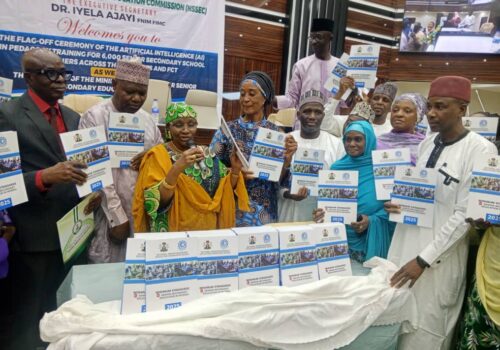The federal government, Tuesday, unveiled minimum standards for senior secondary school education in Nigeria.
Also, an Artificial Intelligence (AI) in Pedagogy training for 6,000 senior secondary school teachers across the 36 states of the federation and the Federal Capital Territory (FCT) was flagged-off.
Speaking at the event organised by the National Senior Secondary Education Commission (NSSEC) and sponsored by Google Research, Minister of Education, Dr. Maruf Olatunji Alausa, who was represented by the Director, Senior Secondary department, Hajia Binta Abdulkadri, said the training was a landmark in the government’s collective commitment to equipping teachers with the skills necessary to prepare Nigerian students for the rapidly evolving digital age.

He said: “Under the Renewed Hope Agenda of President Bola Ahmed Tinubu, our administration has prioritized education as a catalyst for national development. The Federal Ministry of Education, in alignment with this vision, has undertaken several strategic initiatives to reform and modernize our educational sector.
“One of such is the integration of digital literacy and Al-driven pedagogical practices into our teaching methodologies as well as the introduction of a centralised, harmonised databank and unified platform for the entire education sector in Nigeria.
“The world is undergoing a technological revolution, and Artificial Intelligence (Al) is at its core. Al is no longer a futuristic concept but a present-day reality, transforming industries, economies, and societies. As educators, we must embrace this evolution and ensure our education sector is not left behind.
“The integration of Al into pedagogy offers an unprecedented opportunity to enhance learning experiences, personalize education, and develop critical thinking skills among our students. Our goal is to prepare them for careers in a technology-driven world, where Al literacy will be as fundamental as reading and writing.
“Today, we also take a significant step forward with the official unveiling of the Minimum Standards for Senior Secondary Education in Nigeria. This document, which was developed by NSSEC through extensive collaboration with stakeholders and approved by the National Council on Education, will serve as a guiding framework to ensure that senior secondary education across Nigeria adheres to high-quality standards. It is our blueprint for ensuring consistency, accountability, and measurable improvement in our education sector.
“Our commitment to reforming the education sector includes initiatives such as curriculum modernization, teacher training programmes, and infrastructural development. We are also working towards expanding access to digital resources in schools and fostering partnerships with technology firms to bridge the gap between traditional teaching methods and contemporary innovations.”
Also speaking, the Executive Secretary, NSSEC, Dr. Iyela Ajayi, said the minimum standards is a strategic response to the challenges and gaps identified in the senior secondary education sub-sector.
He said: “The Renewed Hope Agenda, a testament to Mr. President’s unwavering commitment to the Nigerian people, recognizes the critical role of education in achieving our collective aspirations. It is a blueprint for a brighter future, one that prioritizes human capital development and empowers every citizen with the knowledge and skills necessary to thrive in the 21st century.
“What we are about to witness today is a reflection of our collective commitment to excellence, equity, and relevance in our senior secondary education system. As we all know, education is the bedrock of any progressive society, and the senior secondary level plays a pivotal role in shaping the future of our young ones, preparing them for higher education, employment, and lifelong skills.
“The Virtual training programme which is sponsored by Google Research and supported by Data Science Nigeria and Olabisi Onabanjo University Ogun State is aimed at enhancing the Al pedagogical skills among senior secondary schools teachers across the 36 States and the FCT. The training is packaged in five modules and is expected to run for a period of five weeks.
“On the other hand, the National Senior Secondary Education Commission, entrusted with the crucial responsibility of repositioning the Senior Secondary Education, provide Intervention in the area of capacity building of teachers, provision of instructional resources among others, has developed Minimum Standards for Senior Secondary Education in Nigeria.
“These minimum standards is a strategic response to the challenges and gaps identified in the senior secondary education sub-sector. Over the years, we have observed disparities in curriculum implementation, teaching quality, school infrastructure, and learners outcomes across different states and schools. These inconsistencies have contributed to uneven access to quality education, limiting the potential of many learners.
“With these newly developed standards, we now have a comprehensive framework that sets clear benchmarks for learning content, teacher qualification, school facilities, learners assessment, and governance in all senior secondary schools across Nigeria. This initiative aligns with global best practices and national policies aimed at ensuring that every child receives a high-quality education, regardless of location or socio-economic background.”
On his part, Mohammed Salihu, Head of Teacher Development and International Partnership, said 130 teachers were selected from each state, while 11 teachers per school were selected from Federal Unity Colleges, adding that the AI in pedagogy training will be online.




 2 hours ago
22
2 hours ago
22







 English (US) ·
English (US) ·